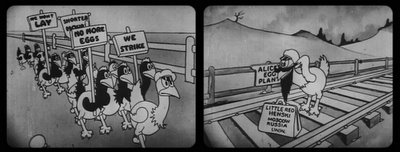
I recently finished watching Disney Rarities, a two-disc set of cartoons produced between the 1920s and the early 1960s.
Being a bit of a Bible-movie geek as well as an animation buff, I have to say I really liked Noah’s Ark (1959), which displays a biblical literacy reminiscent of Disney’s earlier Father Noah’s Ark (1933), and makes wonderfully creative stop-motion use of thimbles, corks, pipe cleaners, paper clips and other common items. The only bit that didn’t work for me — indeed, it felt rather dated — was an odd bit involving a flirtatious hippopotamus, his neglected wife, and Noah’s advice that she should see her hubby’s overtures to other female animals as overtures to herself.
But what jumps out at me is the way political and cultural attitudes of the past are reflected in some of these cartoons — and without the usual disclaimers that have popped up on other recent DVDs! A few of the cartoons are products of the Western genre, and depict Native Americans in less than flattering ways. And at least one cartoon indulges in African stereotypes in its depiction of a safari — although, to be fair, almost all of the American characters depicted in that cartoon represent stereotypes of one sort or another, too, and the cartoon is ultimately not about any of these human characters but is, rather, about a lion in captivity.
And then there is Alice’s Egg Plant (1925), which is one of several fun silent films that mixed live action and animation and were produced by Walt Disney before he became “Walt Disney”.
As you can see from the images above, one of the characters in this film is a rooster or chicken named “Little Red Henski” who comes from the Moscow branch of the International Workers of the World and stirs up trouble on Alice’s farm by “organizing” the chickens and leading them in a strike. And the first time we see him, he is even twirling his fake moustache! Fascinating.
It’s also fascinating to see how Alice, who has just received an order for 5,000 eggs, resolves her dilemma — when she sees that two chickens are about to get into a fight, she proposes that they do it in an arena so that she can charge admission! Alas, the cartoon never says whether the chickens get a cut of the gross.












